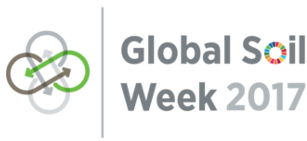![]()
Monday, 20 April 2015
Day 2: Soils in the goals and targets of the new sustainable development agenda
Organisations
AGORA Project (CIAT – International Centre for Tropical Agriculture (Colombia/Kenya), TLC – Total Land Care (Malawi); LUANAR – Lilongwe University of Agriculture and Natural Resources (Malawi); IASS – Institute for Advanced Sustainability Studies (Germany))
GIZ – Deutsche Gesellschaft für Internationale Zusammenarbeit (Germany/Burundi) with Adelphi consult (Germany) & EURAC – European Academy of Bozen/Bolzano (Italy) Governance Links (Tanzania)
SARDC – Southern African Research and Documentation Centre (Zimbabwe)
UNCCD – United Nations Convention to Combat Desertification (Germany)
UNFCCC – United Nations Framework Convention on Climate Change (Germany)
Presentations by
Sergio Zelaya (1 MB)
Katia Simeonova (1 MB)
Huber et al. (5 MB)
Esther Mweso (1 MB)
Henry Sibanda (0.3 MB)
Neto Nengomasha (4 MB)
Please download the Rapporteurs’ Report for this session here.
In recent years, soils have not only re-emerged at the core of the development agenda, but have also increasingly been recognised for their role in carbon sequestration. Soils are the world’s second largest global carbon sink, and climate change science indicates that land is important both for possible mitigation of climate change and adaptation to its effects. A new global climate agreement is due to be adopted in December 2015 and implemented from 2020 on. Land-Use Change and Forestry (LULUCF) play an important role in climate change and for the new agreement. Many sustainable land management (SLM) techniques have the potential to serve the dual purpose of climate change mitigation/adaptation and improvie ecosystems and livelihoods. However, many well-known SLM techniques have not yet been adopted.
This session therefore looks at the interplay of soils and climate and the challenges of governing soils and land in the context of climate change and degradation at multiple levels. Starting with an overview of the global governance of soils and climate, we then examine the related challenges of land management at national level. Taking the examples of Burundi and Malawi, we will address how to design and target actions. The challenges to the adoption of SLM techniques and a successful example of land rehabilitation are then discussed based on insights from Malawi and Zimbabwe. To conclude, we will critically examine the challenges and opportunities for land-based mitigation and adaptation.
You may also be interested in the following Lunch Break Forum (LBF) contributions:
–> LBF-08: Scaling-up of best SLM practices in Ethiopia´s highlands
Programme
Setting the stage: The role of soils in global mitigation and adaptation to climate change
14.00
Opening
Judith Rosendahl, IASS (Germany)
Presentation: The interplay of soils and climate
Rattan Lal, Ohio State University (USA)
Presentation: The role of soils in global climate governance: land-based mitigation and adaptation
Sergio Zelaya, UNCCD (Germany)
Presentation: Opportunities for enhancing land-based mitigation and
adaptation in the new climate agreement
Katia Simeonova, UNFCCC (Germany)
Discussion
14.50
Zooming in I: Land management in the context of climate change at
the national level
Identification of land degradation and vulnerability hot spots to guide policies and actions at national and local levels: the vulnerability assessment in Burundi
(Posters, interviews, short presentation & participative reflection)
Climate change realities in Burundi
Thorsten Huber, GIZ (Germany)
The national vulnerability assessment to identify priority areas and zones
Stefan Schneiderbauer, EURAC (Italy)
Local vulnerability assessment to identify adaptation measures
Christina Bollin, Adelphi consult (Germany)
Land management in the context of climate change in Malawi
Austin Tibu, Ministry for Agriculture and Food Security (Malawi),
Esther Mweso, Concern Universal (Malawi)
Henry Sibanda, UNDP (Malawi)
Discussion
16.00
Coffee Break
16.30
World Café
Zooming in II: Challenges and successes of land management in the context of climate change on the ground. Insights from different countries
- Challenges to the adoption of SLM techniques in Malawi: social and economic factors (AGORA project)
- Successful land rehabilitation in Zimbabwe (Neto Nengomasha, SARDC)
Discussion
Outlook
17.35
Comment and critical assessment
Tim Beringer, IASS (Germany)
Wrap-up and closing
Judith Rosendahl, IASS (Germany)
Contact: Judith Rosendahl
